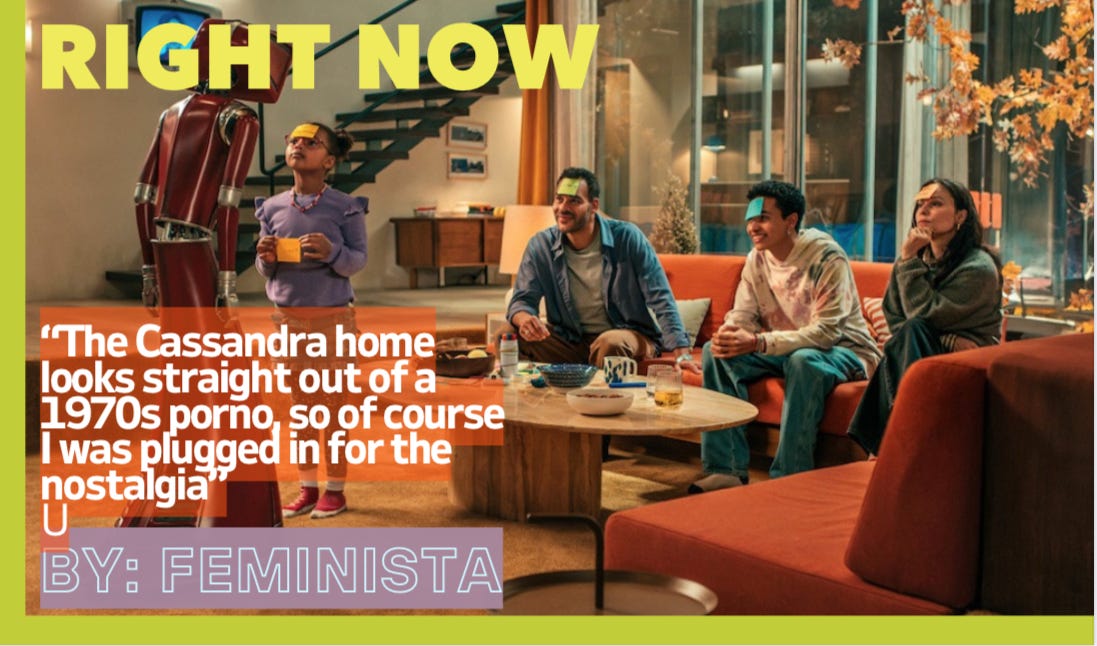Take Notes On Diversity From Cassandra, American Filmmakers
Feminista says the premise is also scary enough to make us reconsider our reliance on AI - and the way the world is going
By Michelle B. Taylor
With so many streaming services offering tons of content from around the world, how deeply do you dig into their catalogs for international series or films you may not otherwise have exposure to? Some days, I feel like I’m constantly watching my television, and I lose track of what I’ve seen. My Letterboxd app is the most neglected app on my phone, I swear. Lately, though, I’ve been watching more international films and television shows and I think I have one you might enjoy.
Netflix advertised Cassandra in the suggested content for me. Their AI know me so well it seems. Ironically, it is a German science fiction thriller series about, well, AI taking over an entire household. The series is about the Prill family, who move into a long-abandoned house equipped with a vintage smart home system named “Cassandra”. The system, and the home to be honest, looks straight out of a 1970s porno, so of course I was plugged in for the nostalgia. “Cassandra”, the robot that reminds me a lot of Rosie from The Jetsons, becomes increasingly determined to integrate herself into the family...by any means necessary.
If you’ve been following me, you know I love a good psychological thriller. And given where we are with experiences with and conversations about the use of A.I. and its increasing presence in our lives, Cassandra is startlingly timely. I mentioned The Jetsons because I grew up watching the cartoon and I believed the lies stories that we would be in flying cars by now and each house would have a robot housekeeper. The propaganda was real, but we allowed ourselves to revel in the fantasy of what life in the future--to be fair, the show is set in 2062, so we still have time to get the cars in the air. I didn’t expect that we would have made as many advancements with artificial intelligence as we have for real. I digress...
“Cassandra” is really an experiment of a weird scientist who found a way to preserve his wife’s spirit by turning her into Boomers’ Alexa. I don’t want to spoil too much, but there is a pretty wild and scandalous backstory to how she came to be encoded into the home indefinitely. She’s got grudges and trauma and tries to manage both by inserting herself into the family’s everyday life. The family is a culturally-mixed family. Italian-Nigerian actor Michael Klammer plays David, a devoted husband and father who seems comfortable embracing the use of “Cassandra” in their home. The mother, Samira, is played by German-Afghan actress Mina Tander who does a great job depicting a skeptical wife and mother who knows something is wrong with “Cassandra” but has to deal with the sexism that relegates women’s intuition to “hysteria”. Joshua Kantara, a young German-Ghanaian actor who has been relatively successful in his short career (Hunger Games: The Ballad of Songbirds and Snakes; Girl You Know It’s True) plays the eldest son Fynn. In addition to having to live with a robot pseudomom with a bad bob cut, he’s gay and deals with his lover being closeted. And then there’s Mary Tölle, a beautiful Afro-European child making her debut as Juno, who is the true star of the film. Much of the film centers around Juno’s interactions with “Cassandra” and how the family confronts the risks of allowing AI too much access.
I wasn’t sure if I was going to like this series but after the first episode, I was locked in. I really enjoyed the multicultural family without making a big deal about race, which is often a central point of American shows. I think American filmmakers and showrunners can take notes on how to be more diverse and inclusive without making that the point. Tölle is the standout for me, but I’m admittedly biased towards talented child stars. The premise is also scary enough to make us pay closer attention to and maybe reconsider our reliance on AI and with the way things have been going in the world lately, I’m starting to watch and read every science-fiction, dystopian-type project as warnings. Seriously. If you enjoyed I, Robot, and M3GAN, you’ll likely enjoy this series. If you’re looking to expand your viewing beyond U.S.-originated content, this is a good foray into German television, an area I had not engaged much until now.
Have you seen it?



I loved pretty much everything about it (just wrote my own Substack on it). For me it wasn't centered on the dangers of AI at all but on how women are forced to support an environment for the development of others within a system they didn't create.